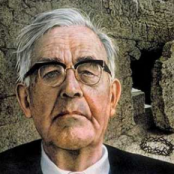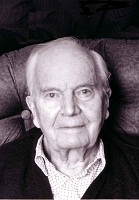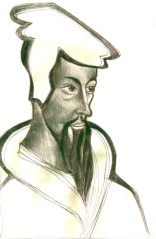 … They both were Dialectic Theologians. Which means that they both were willing to live with what Analytical or Scholastic Theologians would consider probable if not necessary contradictions internal to certain held theological trajectories and beliefs. George Hunsinger helps us how to appreciate this when he writes of Barth:
… They both were Dialectic Theologians. Which means that they both were willing to live with what Analytical or Scholastic Theologians would consider probable if not necessary contradictions internal to certain held theological trajectories and beliefs. George Hunsinger helps us how to appreciate this when he writes of Barth:
[…] A high tolerance for mystery is a hallmark of Barth’s theology—a tolerance which at once separates him from standard modern theologies and unites him with the historic faith of the ecumenical church. His loyalty to the particularities of the biblical witness led him to not shrink from various anomalies as they arose from the subject matter. These anomalies might take the form of unresolved conceptual antitheses, as for example in the doctrine of the Trinity or in the doctrine of the Incarnation. Or they might take the form of discrepancies between eye and ear, as for example in the doctrine of reconciliation, which announces that the world has been reconciled to God, whereas the world as ordinarily observed would seem to be far from being so reconciled. Governed by the particularities of the biblical witness, Barth was inclined to approach such anomalies not by explaining them away, but simply by letting them stand. He was more concerned to avoid premature closure, than to achieve orderly conceptual outcomes. In this sense, the motif of particularism entailed a deep respect for mystery. It was an expression of Barth’s conviction that we walk by faith and not by sight. [George Hunsinger, How to Read Karl Barth: The Shape of His Theology, 44-5 Nook edition]
And then Hunsinger quotes Barth to illustrate his (Hunsinger’s) point in regard to Barth’s particularism and how that worked out for Barth, say in his conception of Divine Freedom:
[I]t is not, then, the rigid presence of a being whose nature we can, so to speak, formulate in this or that principle. God is free to be present with the creature by giving himself and revealing himself to it or by concealing himself and withdrawing from it. God is free to be and operate in the created world wither as unconditioned or as conditioned. God is free to perform his work either within the framework of what we call the laws of nature or outside it in the shape of miracle…. God is free to conceal his divinity from the creature, even to become a creature himself, and free to assume again his Godhead…. God is free to clothe himself with the life of the world in all its glory as with a garment; but free likewise himself to die the death which symbolizes the end of all things earthly, in utter abandonment and darkness…. God is free to be wholly inward to the creature and at the same time as himself wholly outward: totus intra et totus extra and both, of course, as forms of his immanence, of his presence, of the relationship and communion chosen, willed and created by himself between himself and his creation. This is how he meets us in Jesus Christ. His revelation in Jesus Christ embraces all  these apparently so diverse and contradictory possibilities. The are all his possibilities. If we deny him any one of them, we are denying Jesus Christ and God himself. [Karl Barth CD II/1, 314-5 cited by George Hunsinger, How to Read Karl Barth, 45 Nook edition]
these apparently so diverse and contradictory possibilities. The are all his possibilities. If we deny him any one of them, we are denying Jesus Christ and God himself. [Karl Barth CD II/1, 314-5 cited by George Hunsinger, How to Read Karl Barth, 45 Nook edition]
All of the above, can also be applied to how to read Thomas Torrance (and Torrance has his own nuances, but in general the above can apply). And none of this kind of approach is far from the spirit of John Calvin’s approach as what Charles Partee has labeled as a Confessional approach; here is how Partee describes Calvin’s mode (and read this as if it is in the premodern spirit of what we see evinced in the modern one of Barth and Torrance):
Calvin’s theology is properly concerned for right answers, but his right answers should be understood not as a logically unassailable system of ideas but in terms of their adequacy as a heartfelt confession of faith attempting to protect the mystery of God’s revelation. This confessional nature of theology takes precedence over all its rational truth, not even a system rationally explicating revealed truth. Calvin’s theology is a systematic offering of faithful witness to the truth revealed by God in Jesus Christ. [Charles Partee, The Theology of John Calvin, 31 cited in our edited book (Evangelical Calvinism: Essays Resourcing the Continuing Reformation of the Church) from chapter 15 co-written by Myk Habets Myself, from Thesis Statement Nine Evangelical Calvinism is a form of dialectical theology.]
It is improper to come to Barth, Torrance (and/or Calvin for that matter), and expect them to fit into a nice and neat scholastic and analytic form of theologizing; they won’t fit, they fear Procrustean beds too much! And they revere the dynamism and personalism (and in this case particuarlism) of God’s Self-revelation in Jesus Christ too much. So while there is actually much less speculation in their approach to doing Revealed Theology (juxtaposed with classical theology), at the same time, this also, given the strict commitment to following the implications of the Incarnation as they impose and give themselves to us under the weight of its own conceptual  universe of giveness and the categories therein, Barth and Torrance in particular are unwilling to finish-things-off in a way that certain gaps might be filled in to satisfy our own curiosity.
universe of giveness and the categories therein, Barth and Torrance in particular are unwilling to finish-things-off in a way that certain gaps might be filled in to satisfy our own curiosity.
So I think this is important to keep in mind when approaching Barth, Torrance (and even Calvin). It is true that we can definitely do our work After Barth, After Torrance, After Calvin; but we should bear in mind when doing this, that we are constructively engaging with them, and oft times taking them somewhere where a kind of necessitarian logic might want to take us (even being led by things that Barth and Torrance articulated); and yet, Barth and Torrance resisted such moves themselves (and for the reasons noted above).

Pingback: Something Really Important to Understand If You are Going to Read Karl Barth and Thomas Torrance [oh, And Calvin Too!] | ChristianBookBarn.com
Hey Bobby, wasn’t sure if you had seen this yet: http://www.firstthings.com/onthesquare/2013/06/what-scientists-get-and-theologians-donrsquot-about-thomas-f-torrance.
Blessings to you, my friend!
Daniel
LikeLike
Daniel, thank you for the article. Bobby, please help with a question. In the eighth paragraph, the author begins using the word “contingent” in various ways. When I read Incarnation and Atonement, Torrance used this word often in various contexts and I never could quite grasp his use of this word in relation to God and creation (this author is using it in the same way) – can you help? Thanks, Steve
LikeLike
Hey Daniel,
Yes I have, thanks though :-)! We still need to hook up.
Hey Steve,
When TFT speaks of contingence he is referring simply to the reality that the Christian doctrine of creatio ex nihilo (creation out of nothing) presupposes; i.e. that creation is contingent or continuously sustained by the Word of God (Hebrews 1.3). That is, that we don’t ultimately have an independence of our own even if it appears that we do with the naked eye.
Torrance speaks like this: God has independent non-contingence, and creation has independent contingence. Meaning that, of course, God is dependent on nothing outside of himself for his self-existence, but creation is dependent upon God as the sustainer of its existence–and yet within creation there is an independent quality to it in the sense that it is indeed created and not Creator.
Does this help?
LikeLike
Bobby, yes that helps. Not the first point, which is spoken of all throughout Scripture, but the second point is the foggy part. I found one of the passages I was referring to in Atonement (pg 218ff) and you stated it much like T. I guess it is the concept of creation possessing “freedom” that I find challenging. He must be solely talking about man, unless he takes Rom 8:19-22 (where Paul personifies creation) to some philosophic extreme – how can a stone or river have “freedom” merely because it was created? Or is T using the word “freedom” in an unusual way? When it comes to man and his “freedom”, well that, of course, has been debated for a long time and now is not the time or place (slave to sin, etc.). In any case, thanks for your answer, it helped me find the source and now I can follow-up with T. Take care. PS I did an internet search to see if Phillip E Hughes and Torrance crossed. One of the matches was a book by Habets “Theosis in the Theology of Thomas Torrance…” where he references Hughes’ book “True Image…” This book by Hughes is one of my favorites, have you read it?
LikeLike
Steve,
No, Barth and/or Torrance would speak of “freedom” as having only one ontological source, and that is God’s life. There is no such thing as a created quality called freedom that God gives people (to compete with his) in order to be said to have freedom. For Barth and Torrance (and me) our freedom only comes through participating in God’s life; so necessarily, genuine Christian freedom is for Christ (and from), and not against Him.
I haven’t read Hughes’ book, maybe someday.
LikeLike
Pingback: “Here Breaks Out the Veritable God-Sickness” | Blowing on the Embers